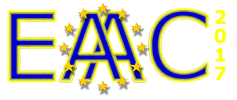Speaker
Mr
Johannes Ding
(Technical University Darmstadt)
Description
High intensity laser driven ion sources are of great interest to researchers in the fields of tumor therapy, isochoric heating or energy loss measurements. The extremely low emittance, high luminosity, short pulse lengths and high field gradients, which allow for very short ion beamlines, make laser driven ion generation the ideal ion source for these applications.
In the context of the Laser Ion Generation, Handling and Transport (LIGHT) collaboration we explore laser driven ion acceleration and beam shaping at “GSI Helmholtzzentrum für Schwerionenforschung”. We therefore combine a target normal sheath acceleration (TNSA) ion source with conventional accelerator technology.
A pulsed solenoid serves as beam collimator and energy selector by means of chromatic focusing. The temporally diverging ion beam can then be compressed with a radiofrequency cavity. In previous experimental campaigns intense multi-MeV sub-nanosecond proton bunches could be generated using the LIGHT beamline.
After the successful demonstration of the transport and bunching of laser-generated fluorine ion beams in 2016, experiments in spring and autumn 2017 aim at laser-generated intense carbon ion beams. I will present first promising results of this novel accelerator concept.
Primary author
Mr
Johannes Ding
(Technical University Darmstadt)
Co-authors
Dr
Abel Blazevic
(GSI Helmholtz Centre)
Dr
Christian Brabetz
(GSI Helmholtz Centre)
Dr
Dennis Schumacher
(GSI Helmholtz Centre)
Diana Jahn
(Technische Universität Darmstadt)
Florian Kroll
(Helmholtz Centre Dresden-Rossendorf)
Florian-Emmanuel Brack
(Helmholtz Centre Dresden-Rossendorf)
Prof.
Markus Roth
(Technische Universität Darmstadt)
Prof.
Thomas Cowan
(Helmholtz Centre Dresden-Rossendorf)
Prof.
Ulrich Schramm
(Helmholtz Centre Dresden-Rossendorf)
Dr
Vincent Bagnoud
(GSI Helmholtz Centre)

